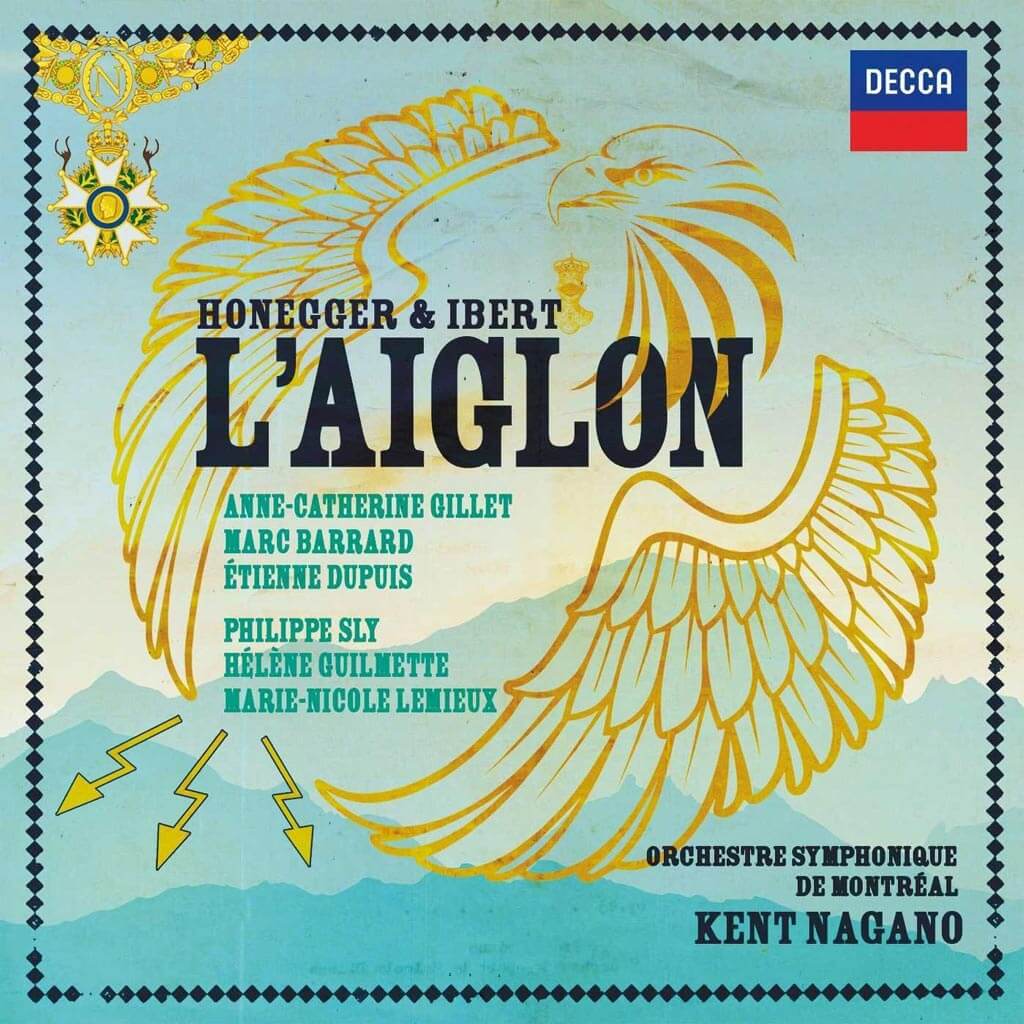
Arthur Honegger & Jacques Ibert: L’Aiglon (The Eaglet). Anne-Catherine Gillet, sop (L’Aiglon). Marc Barrard, bar (Flambeau). Étienne Dupuis, bar (Metternich). OSM Chorus. Orchestre symphonique de Montréal (OSM)/Kent Nagano. Decca 478 9502 (2 CDs). Total Time: 92.29.
I suspect that this new recording will come as a complete surprise to most music-lovers. Who knew that two leading 20th-century French composers had collaborated on an opera? In fact, Honegger and Ibert had done just that. There was even a recording (incomplete) of L’Aiglon (The Eaglet) made in the LP era (1956), but it was never re-released on CD.
Obscure pieces do turn up from time to time; not all are notable, but this one is a genuine discovery — or re-discovery if you will. The libretto, based on a play by Edmond Rostand – the man who wrote Cyrano de Bergerac – is excellent, and the music is superb. To top it off, we have a performance that makes the best possible case for the opera.
L’Aiglon premiered (1937) in Monte Carlo. The “Eaglet” of the title was Napoleon’s only son, Napoleon II. When his father was removed from power in 1815, the young man was sent to the court of Austria and given the title, Duke of Reichstadt. The opera deals with the Napoleon II’s dreams of continuing his father’s work of making France the dominant power in Europe. Ultimately, his dreams come to nothing, and the opera ends with his death at the age of 21.
Apparently, Ibert wrote Acts I and V of the opera and Honegger composed Acts II and IV. They both worked on Act II. While the opera was not overtly political, its celebration of French nationalism — it even quotes French revolutionary songs and “La Marseillaise” — meant that it would be unacceptable to the German occupation authorities during World War II.
An interesting feature of the opera is that the role of Napoleon II/Duke of Reichstadt is given to a soprano, making it another in a long tradition of memorable trouser roles ranging from Cherubino to Octavian. In this performance, Anne-Catherine Gillet is magnificent as the troubled young man. She sings beautifully and encompasses a vast range of expression in her portrayal. Marc Barrard as Flambeau and Etienne Dupuis as Metternich are equally convincing.
Ibert’s ballet music from the beginning of Act III is especially memorable. This is Viennese waltz music, with a deliciously melancholy quiet section repeated several times over. This nine-minute waltz sequence deserves to have a separate life as a concert piece.
Honegger’s quite different music for the “Eaglet’s” battlefield delusions in Act IV is both imaginative and powerful, especially in its use of the chorus. Some of this music was taken from the score he had composed for Abel Gance’s 1927 film, Napoléon.
A fair criticism could be made that the opera begins as operetta and ends as tragedy. The charm of the first three acts is almost totally absent in Acts IV and V. On the other hand, one could argue that this juxtaposition of styles accurately represents the conflict between the outer and inner lives of the ill-fated “Eaglet,” Napoleon II/Duke of Reichstadt.
Kent Nagano conducts L’Aiglon with a sure sense of style and colour, and the Decca engineers have given the performance excellent reproduction. Credit should also be given to the superior acoustical qualities of the OSM’s home, Maison symphonique.
Honegger & Ibert: L’Aiglon (Live in Montreal, 2015) is available at Amazon.com and iTunes.
#LUDWIGVAN
Follow Musical Toronto on Facebook for the latest classical and opera news, funny stuff, and an insider POV.
- SCRUTINY | TSO Lets Berlioz Do The Talking In Season Opener - September 21, 2018
- RECORD KEEPING | Even Yannick Nézet-Séguin Can’t Make Us Love Mozart’s La Clemenza di Tito - September 6, 2018
- RECORD KEEPING | Giovanna d’Arco With Anna Netrebko Explains Why The Best Operas Survive - August 30, 2018



